
Exotica is a 1994 Canadian film written and directed by Atom Egoyan, and starring Bruce Greenwood, Mia Kirshner, Don McKellar, Arsinée Khanjian, and Elias Koteas. Set primarily in the fictional Exotica strip club in Toronto, the film concerns a father grieving over the loss of a child and obsessed with a young stripper. It was inspired by Egoyan's curiosity about the role strip clubs play in sex-obsessed societies. Exotica was filmed in Toronto in 1993.

The Limey is a 1999 American crime film directed by Steven Soderbergh and written by Lem Dobbs. The film features Terence Stamp, Lesley Ann Warren, Luis Guzmán, Barry Newman, Nicky Katt, and Peter Fonda. The plot concerns an English career criminal (Stamp) who travels to the United States to investigate the recent suspicious death of his daughter. It was filmed on location in Los Angeles and Big Sur.
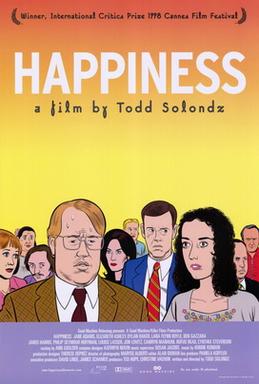
Happiness is a 1998 American black comedy film written and directed by Todd Solondz, that portrays the lives of three sisters, their families, and those around them. The film was awarded the FIPRESCI Prize at the 1998 Cannes Film Festival for "its bold tracking of controversial contemporary themes, richly-layered subtext, and remarkable fluidity of visual style," and the cast received the National Board of Review award for best ensemble performance.
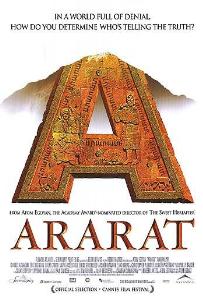
Ararat is a 2002 historical-drama film written and directed by Atom Egoyan and starring Charles Aznavour, Christopher Plummer, David Alpay, Arsinée Khanjian, Eric Bogosian, Bruce Greenwood and Elias Koteas. It is about a family and film crew in Toronto working on a film based loosely on the 1915 defense of Van during the Armenian genocide. In addition to exploring the human impact of that specific historical event, Ararat examines the nature of truth and its representation through art. The genocide is disputed by the Government of Turkey, an issue that partially inspired and is explored in the film.
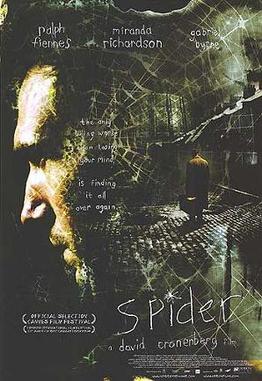
Spider is a 2002 psychological thriller film produced and directed by David Cronenberg and based on the 1990 novel of the same name by Patrick McGrath, who also wrote the screenplay.

Kansas City is a 1996 American crime film directed by Robert Altman, and starring Jennifer Jason Leigh, Miranda Richardson, Harry Belafonte, Michael Murphy and Steve Buscemi. The musical score of Kansas City is integrated into the film, with modern-day musicians recreating the Kansas City jazz of 1930s.
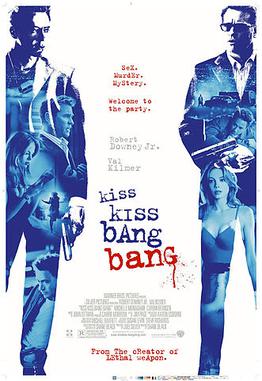
Kiss Kiss Bang Bang is a 2005 American neo-noir black comedy crime film written and directed by Shane Black, and starring Robert Downey Jr., Val Kilmer, Michelle Monaghan, and Corbin Bernsen. The script is partially based on the Brett Halliday novel Bodies Are Where You Find Them (1941), and interprets the classic hardboiled literary genre in a tongue-in-cheek fashion. The film was produced by Joel Silver, with Susan Levin and Steve Richards as executive producers.
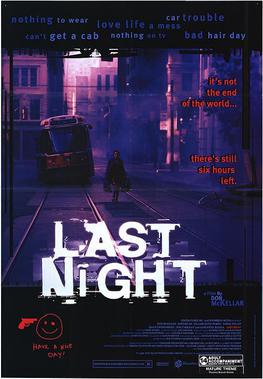
Last Night is a 1998 Canadian apocalyptic black comedy-drama film directed by Don McKellar and starring McKellar, Sandra Oh and Callum Keith Rennie. It was produced as part of the French film project 2000, Seen By.... McKellar wrote the screenplay about how ordinary people would react to an unstated imminent global catastrophic event. Set in Toronto, Ontario, the film was made and released when many were concerned about the Year 2000 problem.

Where the Truth Lies is a 2005 thriller film written and directed by Atom Egoyan and starring Kevin Bacon, Colin Firth, and Alison Lohman. It is based on Rupert Holmes's 2003 novel of the same name.
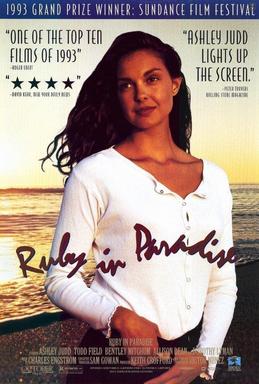
Ruby in Paradise is a 1993 film written and directed by Victor Nunez, starring Ashley Judd, Todd Field, Bentley Mitchum, Allison Dean, and Dorothy Lyman. An homage to Northanger Abbey by Jane Austen, the film is a character study about a young woman who escapes her small town in Tennessee for a new life in coastal Florida. The film marks Judd’s first starring role.
The 20th Genie Awards were held on January 30, 2000, by the Academy of Canadian Cinema & Television, to honour films released in 1999. The ceremony aired live on CBC Television, and a post-event highlights show aired on Radio Canada.

The Adjuster is a 1991 Canadian drama film directed by Atom Egoyan, his fourth feature film and the first to achieve international acclaim. The film has won five awards, as well as two other nominations upon its initial release.
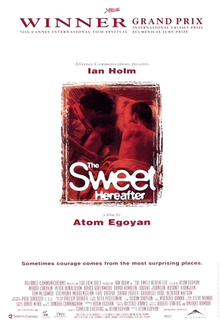
The Sweet Hereafter is a 1997 Canadian drama film written and directed by Atom Egoyan, adapted from the 1991 novel by Russell Banks. It tells the story of a school bus accident in a small town that kills 14 children. A class-action lawsuit ensues, proving divisive in the community and becoming tied with personal and family issues. It stars an ensemble cast featuring Ian Holm, Sarah Polley, Maury Chaykin, Bruce Greenwood, Tom McCamus, Gabrielle Rose, Arsinée Khanjian and Alberta Watson.

Monsieur Hire is a 1989 French crime drama film directed by Patrice Leconte and starring Michel Blanc in the title role and Sandrine Bonnaire as the object of Hire's affection. The film received numerous accolades as well as a glowing review from the American film critic Roger Ebert, who later added the film to his list of "Great Movies." The screenplay of the film is based on the novel Les Fiançailles de M. Hire by Georges Simenon and has original music by Michael Nyman. Simenon's novel was previously filmed in 1947 by Julien Duvivier as Panic (Panique) starring Michel Simon.

Adoration is a 2008 Canadian drama film directed by Atom Egoyan and starring Rachel Blanchard, Scott Speedman and Devon Bostick.

Life, Above All is a 2010 South African drama film directed by Oliver Schmitz. It was screened in the Un Certain Regard section of the 2010 Cannes Film Festival. The film was selected as the South African entry for the Best Foreign Language Film at the 83rd Academy Awards and made the final shortlist announced in January 2011. The film was adapted from the 2004 novel Chanda's Secrets by Allan Stratton.
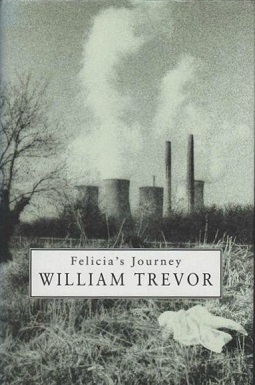
Felicia's Journey is a novel written by Irish author William Trevor, first published by Viking Press in 1994. The novel was made into a 1999 film of the same name.

Oslo, August 31st is a 2011 Norwegian drama film directed by Joachim Trier. It is the second film, along with Reprise (2006) and The Worst Person in the World (2021), in Trier's Oslo trilogy. The film is a homage to, and loosely based on Pierre Drieu La Rochelle's novel Will O' the Wisp (1931) and Louis Malle's feature film The Fire Within (1963).

The Captive is a 2014 Canadian thriller film directed by Atom Egoyan with a script he co-wrote with David Fraser. The film stars Ryan Reynolds, Bruce Greenwood, Scott Speedman, Rosario Dawson, Mireille Enos, Kevin Durand, and Alexia Fast. It was selected to compete for the Palme d'Or in the main competition section at the 2014 Cannes Film Festival. The film was released in select theaters and on demand on December 12, 2014.
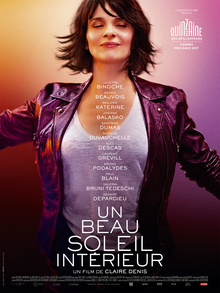
Let the Sunshine In, or Bright Sunshine In, is a 2017 French romantic drama film directed by Claire Denis. The film is an adaptation of Roland Barthes's 1977 text A Lover's Discourse: Fragments. Novelist Christine Angot and frequent Denis collaborator Jean-Pol Fargeau have both been reported as Denis's co-writers on the project. It opened the Directors' Fortnight section of the 2017 Cannes Film Festival. At Cannes, it won the SACD Award.



















